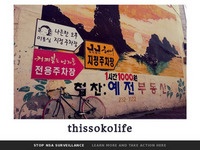- Home » Expat Articles » Interviews » British Expat Living in South Korea - Interview with Yvette
British Expat Living in South Korea - Interview with Yvette
| Published: | 18 Mar at 9 AM |
Want to get involved?
Become a Featured Expat and take our interview.
Become a Local Expert and contribute articles.
Get in touch today!
Become a Local Expert and contribute articles.
Get in touch today!
Filed: Interviews,Korea South
From the African Bush to London's urban jungle, from the depths of the deep blue sea to the top of fresh pow slopes, Yvette's goal is to cram the world into a lifetime's travel. She's visited more than 20 countries, worked & lived in 9 and can swear in at least 7 languages. Her dream is to be a true citizen of the world. This chick loves being outdoors, taking photos and eating good food with good people. She’s addicted to coffee and chilli. To her, time has more value than money, a new adventure is more valuable than gold trinkets. When it comes to choosing, she’ll run with freedom over settling for routine. Yvette's expat blog is called thissokolife (see listing here)
Where are you originally from?
I was born in South Africa and moved to London after uni. What started as a gap year changed into a new home and life for me.
In which country and city are you living now?
I currently live and teach in Pohang, South Korea.
How long have you lived in South Korea and how long are you planning to stay?
I've just completed my first year and I have another year in mind.
Why did you move to Korea South and what do you do?
I used to teach scuba diving and wanted to add another string to my bow. I've worked in South East Asia before and would like to see the business end of Asia. My loose 5 year plan is to live in Korea, Japan and China. I have a great passion for the cultural and historical riches of these 3 countries.
Did you bring family with you?
No.
How did you find the transition to living in a foreign country?
Getting used to Korea took a bit longer than any other country I've lived in before. The first month was tough: setting up a bank account, figuring out the public transport system, grocery shopping! If you don't live in Seoul or Busan it becomes very important that you learn Hangeul as soon as possible. Life becomes a lot easier once you can read ;)
Was it easy making friends and meeting people; do you mainly socialise with other expats?
Yes but it's worth keeping in mind that most expats here are between 21- 29 years old. It's harder to find expat pals in their mid to late thirties.
What are the best things to do in the area; anything to recommend to future expats?
Pohang is known for partying and playing sport on the beach, especially frisbee. Frisbee is huge here. You'll probably find that you have the same access, if not more, to sports that you played back home or always wanted to try out. I've done a marathon, triathlon and snowboarding. I've also cycled from Seoul to Busan. This year I plan to learn rock climbing and windsurfing- all in Pohang.
What do you enjoy most about living in South Korea?
Work life balance is very important to me. I love my job but I also love spending time outdoors. Korean food is great and the people are very passionate about having hobbies, whether it be golf or jetskiiing.
How does the cost of living in South Korea compare to home?
Everyone complains about the price of fruit and veg here but the general cost of living is low. You will have loads of spare cash to throw at your student loan/ credit card/ savings/ drinking habit (choose as applicable).
What negatives, if any, are there to living in South Korea?
The language barrier can be frustrating at times.
If you could pick one piece of advice to anyone moving to South Korea, what would it be?
Give it time, be patient with yourself and your new environment. You can learn and hone attributes here that will enhance your interpersonal business skills and make you more employable back home.
What has been the hardest aspect to your expat experience so far?
Unexpected last minute schedule changes are par for the course here. Racism still exists but you can make a difference by interacting with Koreans in a positive way.
When you finally return home, how do you think you'll cope with repatriation?
Whenever I go back to London, people's stress and anger levels are always noticeable. Korean students are very friendly and will greet you on the street. In London you usually cross to the other side of the street when you see a large group of yoof! It often feels like recruiters treat you like you've been on holiday even if you've been managing and educating people and you might have to start at the bottom of the ladder when you get back home.
What are your top 5 expat tips for anyone following in your footsteps?
There is more to Korea than living in Seoul or Busan. It's about cycling, snowboarding, rock climbing and yoga. It's about checking out my 'hood, Pohang: coffee shops, beaches and art! It's about learning more about Korean healthcare, education, Korean friends & colleagues, the kids I teach and the strangers who become friends along the way.
How can you be contacted for further advice to future expats coming to your area?
You're welcome to contact me through my blog and YouTube channel.
Here's the interview with Yvette...
Where are you originally from?
I was born in South Africa and moved to London after uni. What started as a gap year changed into a new home and life for me.
In which country and city are you living now?
I currently live and teach in Pohang, South Korea.
How long have you lived in South Korea and how long are you planning to stay?
I've just completed my first year and I have another year in mind.
Why did you move to Korea South and what do you do?
I used to teach scuba diving and wanted to add another string to my bow. I've worked in South East Asia before and would like to see the business end of Asia. My loose 5 year plan is to live in Korea, Japan and China. I have a great passion for the cultural and historical riches of these 3 countries.
Did you bring family with you?
No.
How did you find the transition to living in a foreign country?
Getting used to Korea took a bit longer than any other country I've lived in before. The first month was tough: setting up a bank account, figuring out the public transport system, grocery shopping! If you don't live in Seoul or Busan it becomes very important that you learn Hangeul as soon as possible. Life becomes a lot easier once you can read ;)
Was it easy making friends and meeting people; do you mainly socialise with other expats?
Yes but it's worth keeping in mind that most expats here are between 21- 29 years old. It's harder to find expat pals in their mid to late thirties.
What are the best things to do in the area; anything to recommend to future expats?
Pohang is known for partying and playing sport on the beach, especially frisbee. Frisbee is huge here. You'll probably find that you have the same access, if not more, to sports that you played back home or always wanted to try out. I've done a marathon, triathlon and snowboarding. I've also cycled from Seoul to Busan. This year I plan to learn rock climbing and windsurfing- all in Pohang.
What do you enjoy most about living in South Korea?
Work life balance is very important to me. I love my job but I also love spending time outdoors. Korean food is great and the people are very passionate about having hobbies, whether it be golf or jetskiiing.
How does the cost of living in South Korea compare to home?
Everyone complains about the price of fruit and veg here but the general cost of living is low. You will have loads of spare cash to throw at your student loan/ credit card/ savings/ drinking habit (choose as applicable).
What negatives, if any, are there to living in South Korea?
The language barrier can be frustrating at times.
If you could pick one piece of advice to anyone moving to South Korea, what would it be?
Give it time, be patient with yourself and your new environment. You can learn and hone attributes here that will enhance your interpersonal business skills and make you more employable back home.
What has been the hardest aspect to your expat experience so far?
Unexpected last minute schedule changes are par for the course here. Racism still exists but you can make a difference by interacting with Koreans in a positive way.
When you finally return home, how do you think you'll cope with repatriation?
Whenever I go back to London, people's stress and anger levels are always noticeable. Korean students are very friendly and will greet you on the street. In London you usually cross to the other side of the street when you see a large group of yoof! It often feels like recruiters treat you like you've been on holiday even if you've been managing and educating people and you might have to start at the bottom of the ladder when you get back home.
What are your top 5 expat tips for anyone following in your footsteps?
- Learn the Korean alphabet.
- Take up a sport to meet people- expats and locals bond beyond language barriers when a common interest is shared.
- If you're not flexible, you're gonna have a bad time. Go with the flow because plans change often and notice is usually on the short side!
- Eat local, live local, learn as much as you can about the history, food and culture here. Step outside of your comfort zone. You didn't come all this way to eat a hamburger, right?
- Make friends with Koreans, especially older people- see the country through their eyes. They are a great source of information and good stories.
There is more to Korea than living in Seoul or Busan. It's about cycling, snowboarding, rock climbing and yoga. It's about checking out my 'hood, Pohang: coffee shops, beaches and art! It's about learning more about Korean healthcare, education, Korean friends & colleagues, the kids I teach and the strangers who become friends along the way.
How can you be contacted for further advice to future expats coming to your area?
You're welcome to contact me through my blog and YouTube channel.
Grab a featured expat badge that links to this interview!
 Copy and paste code to display the Featured Expat Badge:
Copy and paste code to display the Featured Expat Badge:Comments » No published comments just yet for this article...
Feel free to have your say on this item. Go on... be the first!


 Yvette is a British expat living in Korea South. Blog description: Curious about the lifestyle you can expect to enjoy in Korea?Born and raised in South Africa, pickled in London and seasoned by travel, let me tell you about sport, craft and culture in Korea.
Yvette is a British expat living in Korea South. Blog description: Curious about the lifestyle you can expect to enjoy in Korea?Born and raised in South Africa, pickled in London and seasoned by travel, let me tell you about sport, craft and culture in Korea.





